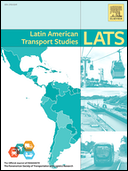SAFETYLIT WEEKLY UPDATE
SafetyLit Journal DetailsWe are unable to provide photocopies of any the articles and reports abstracted in SafetyLit updates. Where possible, links have been provided to the publisher of the material and contact information for the corresponding author is listed. Please consider asking your library to subscribe to the journals from which these abstracts have been gathered. |
|
Latin American transport studiesAbbreviation: Lat. Am. Transp. Stud.Published by: Elsevier Publishing Publisher Location: Amsterdam, Netherlands Journal Website:
Publication Date Range: 2023 -- Title began with volume (issue): 1() Number of articles from this journal included in the SafetyLit database:
4 eISSN = 2950-0249 Find a library that holds this journal: http://worldcat.org/issn/29500249 Journal Language(s): English
|
|
